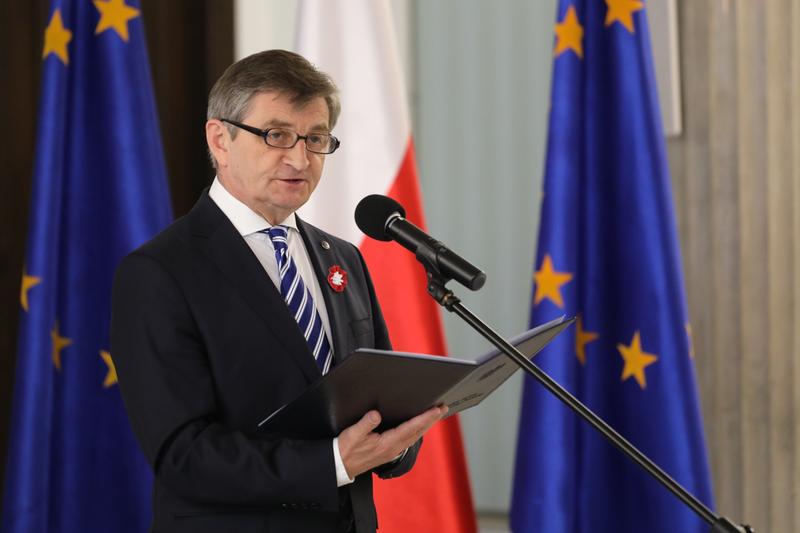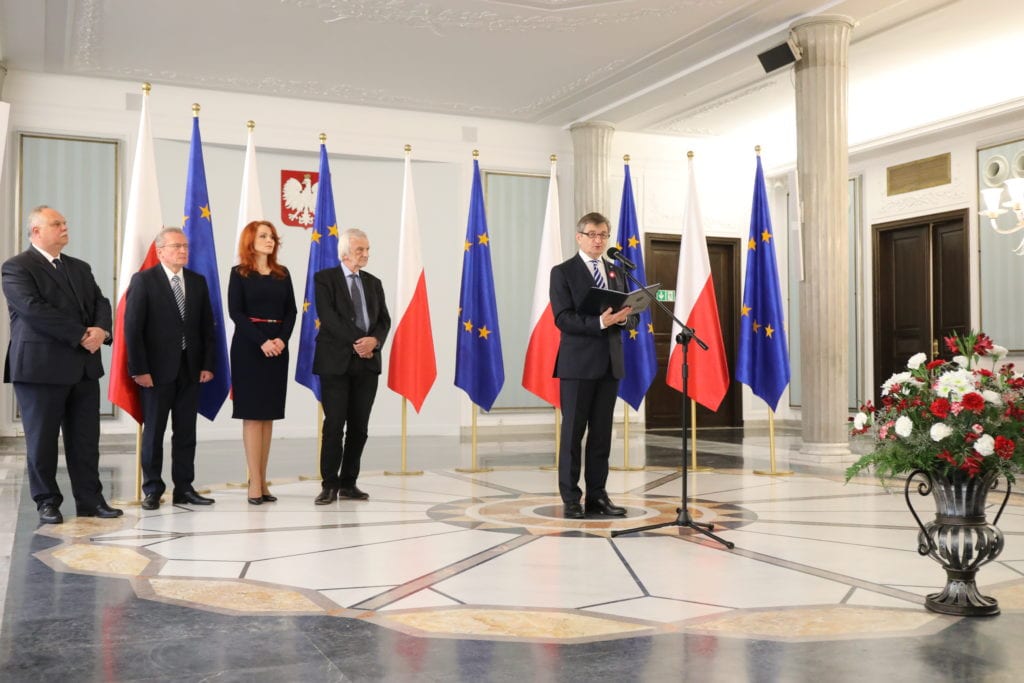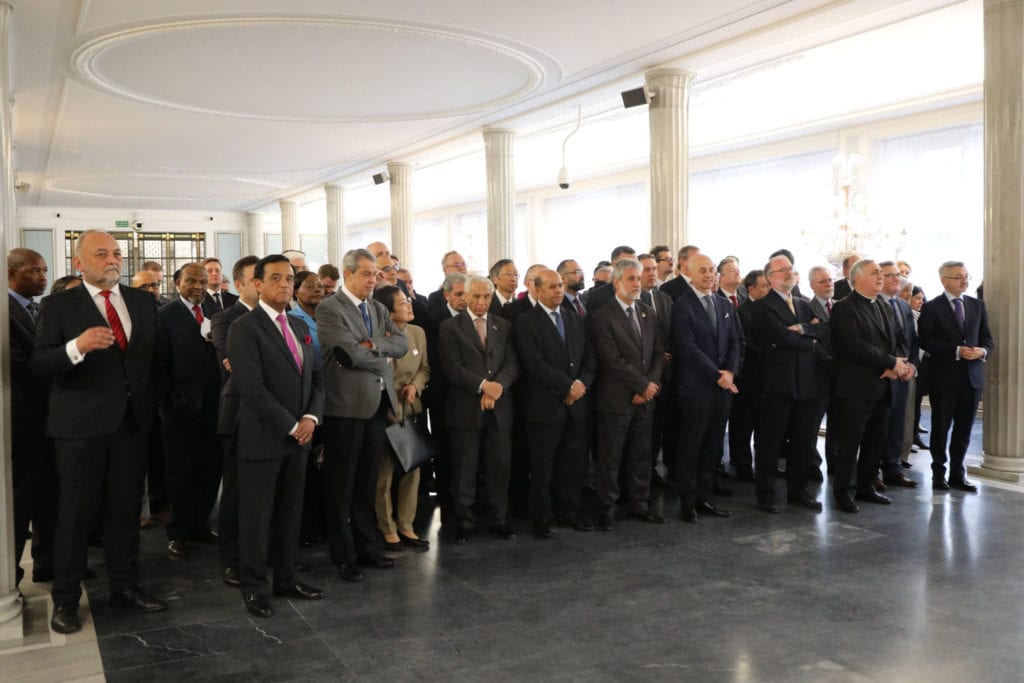On the occasion of the National Day of the Constitution of May 3, the Speaker of the Sejm Marek Kuchciński met with the diplomatic corps in the Columned Hall on Monday. Thanking the diplomats for their presence, the Speaker of the Sejm pointed to anniversaries important for the House: 450th anniversary of joining the Union of Lublin in 1569 and 100th anniversary of the proclamation of the 3rd of May Constitution Day in February 1919. - The modern Parliament is a fundamental part of the political system of the Republic of Poland. Last year, on the occasion of the celebrations of the 550th anniversary of Polish parliamentarism, many meetings, symposia and conferences were held, which showed that the adoption of the May 3rd Constitution in 1791 is considered by both politicians and citizens as the most outstanding achievement of Polish parliamentarism," said Marshal Kuchciński. He reminded that on June 30th there will be a joint Polish-Lithuanian celebration in Lublin of the 450th anniversary of the Union of Lublin.
The meeting was also attended by Ryszard Terlecki, Deputy Speaker of the Sejm, Agnieszka Kaczmarska, Head of the Chancellery of the Sejm, together with her deputies, and the Dean of the Diplomatic Corps, Archbishop Salvatore Pennacchio, Apostolic Nuncio.
In his speech, the Speaker of the Sejm referred to the 15th anniversary of the membership of Poland and other Central European countries in the European Union and the 20th anniversary of NATO membership. - First of all, it is the end of the post-war division of Europe. And I hope that soon other countries from our part of Europe will also be accepted both to the North Atlantic Alliance and the EU.
At the meeting there was no lack of reference to the events carried out by the Sejm. Speaker Kuchciński drew attention to the initiative of the Sejm in 2016 to convene the Summits of Presidents of the Central and Eastern European Parliaments, whose sessions are held annually in Warsaw. - Currently, preparations are underway for the fourth summit, which will be held on 4-5 June. Many of you will therefore be meeting with us during the Summit. The planned Summit is important to us because of the date. Thirty years ago, on June 4, Poland held its first partially free elections to the Sejm and completely free elections to the Senate. The Polish people wanted a fundamental change in history and expressed it at the ballot box," assessed the Speaker of the Sejm.
Marek Kuchciński also reminded that the Sejm always supports cooperation within the bilateral friendship groups. He also emphasized the importance of international initiatives, such as the Tri-City initiative, as well as international cooperation with parliaments of other countries, not only European, or participation of Polish delegations in meetings of NATO, the Council of Europe, the OSCE, the Visegrad Group and Carpathian Europe. - Our diplomatic activity develops beyond the sphere of pure parliamentary cooperation. It is also expressed in the cooperation of Carpathian countries. Its development element is the cyclical Carpathian Europe Conference held in many places in Poland. Recently in Krasiczyn, the next one is organized in Krynica as a part of Economic Forum on September 4-6, to which I cordially invite you - said Marshal Kuchciński.
Meetings of the members of the diplomatic corps with the Speaker of the Sejm have been held regularly for many years. They are an opportunity to discuss current issues, Sejm activities in the field of international cooperation, as well as informal talks.
The entire speech of the Speaker of the Sejm Marek Kuchcinski:
Your Excellency, Archbishop, Dean of the Diplomatic Corps in Poland,
Excellencies, Distinguished Ladies and Gentlemen Ambassadors,
Welcome and thank you for accepting the invitation to the Sejm, to today's a meeting that takes place in a year of great anniversaries history of parliamentarism, on the 450th anniversary of the Union of Lublin, which was undertaken in 1569.
Former parliament fulfilled the role of representation of the political nation, which was the nobility since the Middle Ages, since the reign of King Casimir the Great, and then during the reigns of Louis the Hungarian, Ladislaus Jagiello and Casimir Jagiellon took on legislative and control functions. Nowadays, the parliament is a fundamental part of the political system of the Republic of Poland determining its democratic face.
Last year, on the occasion of the celebrations of the 550th anniversary of Polish parliamentarism, many meetings, symposia and conferences took place, which showed that the adoption of the Constitution of May 3rd in 1791 is considered the most outstanding achievement of Polish parliamentarism.
The 3rd of May Constitution was such an important act for Poles that in February 1919, the Legislative Sejm, whose 100th anniversary we are now celebrating, declared May 3rd a national holiday.
The Constitution was a joint work of representatives of nations living within one state - the Polish-Lithuanian Commonwealth. Today, May 3 Constitution Day is also a holiday in Lithuania.
In 1569 Poland and Lithuania were united by the Union of Lublin - an equal and voluntary state union. Its 450th anniversary will be jointly celebrated on 30 June in Lublin. To the celebrations we have invited Speakers of Parliaments of countries, whose lands and nations at that time were also part of the Polish-Lithuanian Commonwealth. I would also like to invite you - representatives of the diplomatic corps - to participate in this event.
Ladies and Gentlemen, I think we can naturally pass at this point From the Union of Lublin to the European Union.
This year we celebrate the 15th anniversary of Poland and other Central European countries joining the European Union, and the 20th anniversary of Poland joining NATO. It is historically significant in every dimension, above all it is the end of the post-war division of Europe. And I hope that in the near future other countries in our part of Europe will also be admitted to both NATO and the EU.
I would like to mention a recent event, the Conference of Speakers of EU Parliaments in Vienna. It reflects a flexible response to emerging problems and attempts to resolve them constructively.
The Polish Parliament values every form of international cooperation, but it is with real satisfaction that we support multilateral initiatives. I am thinking here of the 2016 initiative to convene the Summit of Speakers of Parliaments of Central and Eastern Europe. The Summit is held annually in Warsaw. Preparations are now underway for the 4th Summit, which will take place on 4-5 June. We will therefore be meeting with many of you during the Summit when you accompany your delegations.
The summit is also important because of the date of 4 June 1989, when the first partially free parliamentary elections were held in Poland thirty years ago. That year, changes also took place in Hungary and the then Czechoslovakia in the form of the Velvet Revolution. These events took place before the Berlin Wall came down.
In Poland, the Nation wanted historic change and expressed it absolutely unequivocally at the ballot box.
It is also worth mentioning the Tri-Morocco Initiative, which focuses the most important things: the idea of integration with efforts to ensure the security of countries and nations, including energy security and expansion of communication networks.
The Polish Sejm develops parliamentary diplomacy in all possible and important areas. An example is last year's spring session of the NATO Parliamentary Assembly in Warsaw. The session went well and was a success.
I would also like to point to the activity of Polish parliamentary delegations to NATO, the Council of Europe, and the OSCE. We send our delegations to observe elections in many countries.
The Polish delegation to the Parliamentary Assembly of the Council of Europe initiated the adopted resolution on the return by Russia of the wreckage of the plane from the Smolensk crash. This matter is still unfinished.
Actively involved Parliamentary Assemblies. In November last year the Trilateral Assembly of Poland-Lithuania-Ukraine was held. And in February this year, after a 10-year break, a session of the Parliamentary Assembly of the Polish Seimas and Senate and the Seimas of Lithuania was held.
A new Polish-Georgian Parliamentary Assembly has recently joined the list of Assemblies. Its first session took place in February this year and was preceded by my visit to Georgia in November 2018.
Cooperation between the Poland-Moldova Parliamentary Assembly, which met for the fifth time in July 2018, this time in Chisinau, is also going well. We also continue Polish-Ukrainian parliamentary cooperation as evidenced by the 11th session of the Parliamentary Assembly of Poland and Ukraine in March this year in Kiev and cooperation within bilateral parliamentary groups.
I have extremely good news to share about our collaboration with Visegrad GroupWe have met three times during the Slovak Presidency at the level of parliamentary presidents. We have met three times during the Slovak Presidency at the level of parliamentary presidents, and the meeting formula is constantly being extended to include new countries, which may testify to its attractiveness for the region.
Close cooperation within the Visegrad Group does not eliminate or limit bilateral cooperation between individual Visegrad Parliaments. We continue meetings of the Presidiums of the Sejm and the Chamber of Deputies of the Czech Republic, and relations with the Hungarian Parliament remain consistently very active, including strictly parliamentary meetings, but also events of a broader nature, such as my participation in a conference at the Hungarian National Assembly to mark the centenary of Poland's independence.
Our cooperation also affects extra-parliamentary areas, which is expressed, for example, in the cooperation of the Carpathian countries. Its permanent and developing element is the conference Carpathian Europe. This year's one, with a rich theme, was held in February in Krasiczyn. We continue our September meetings of the Carpathian Europe series in Krynica Zdroj as part of the Economic Forum (September 3-5, 2019). And we invite you to participate.
One of the effects of raising the significance of the Central European region and multilateral Carpathian cooperation is the establishment of a working agreement by a group of universities from the Carpathian countries - V4 plus Romania and Ukraine. It has adopted the Latin name Collegium Carpathicum. We support this type of activity in the region.
Bilateral cooperation realized in the framework of bilateral meetings is also important. An example of such an initiative is last year's 6th Poland-Spain Parliamentary Forum in Santiago de Compostela.
A lively and dynamic cooperation links the Polish Sejm with the parliaments of the Balkan countries. I would like to emphasize the active participation of the Presidents and representatives of the Parliaments in the Warsaw Summits, which encourages bilateral meetings and consultations. Very dynamic is the parliamentary cooperation and participation in multilateral meetings of political and historical nature. I would like to inform you that to the existing cooperation of bilateral groups, we have added a new form of cooperation, which is the regional Polish-Balkan Parliamentary Group, established in January this year. In March, a delegation of the Group visited Serbia and North Macedonia.
We always strongly support cooperation in bilateral friendship groups. New groups are being formed all the time and there are currently 85 in the Diet.
Over the past 12 months the Polish Parliament has hosted many visits, but our delegations have also visited friendly parliaments. The cooperation included, among others, parliaments of Albania, Saudi Arabia, Armenia, Australia, Belarus, Bulgaria, Croatia, Montenegro, Czech Republic, Philippines, Iran, Ireland, Kazakhstan, North Macedonia, Morocco, Mongolia, Germany, Norway, Slovakia, Swiss Confederation, Ukraine, Vietnam.
Among the list of events in relations with other countries, I would like to mention the activity in relations with the Parliament of Japan, as well as the organization of Asia-Pacific Day.
Our international cooperation goes beyond the purely parliamentary dimension. In the last 12 months I have met with the Heads of State and Government of: Czech Republic, Slovakia, Hungary, Lithuania, Georgia and the Presidents of the parliaments of the above countries, as well as: Senate of Romania, State Council of Slovenia, Council of the Republic of Belarus and Swedish Riksdag.
Excellencies, Ladies and Gentlemen, the information presented indicates only some of the visits, meetings, conferences. I have mentioned mainly those which confirm and illustrate some tendency or direction. I am glad that I could do it during the celebrations on the occasion of our National Holiday, to which you came to pay homage together to this great work of the Polish parliamentarism and to express your friendship and support for Poland, for which I thank you very much
Photo by Rafał Zambrzycki





